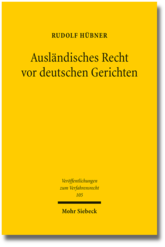Ortolani’s View on the Wathelet Opinion
The AG opinion on Gazprom has triggered quite a lot of reactions within the arbitral world. I asked Dr. Pietro Ortolani, senior research fellow at the MPI Luxembourg, to allow me to have his published in CoL as well. Here they are.
The Advocate General’s Opinion on C-536/13 Gazprom raises several interesting points, but it is doubtful whether the same approach will be adopted by the CJEU. Interestingly enough, it relies heavily on the recast Regulation, although it is not applicable ratione temporis. The AG argues that the recital operates in the manner of a “retroactive interpretative law”; however, this seems quite far-fetched, as a recital is not a binding provision of the Regulation and, as such, it should not be interpreted as having drastic effects on the way the Brussels I system operates (especially as far as the pre-recast scenarios are concerned). Two points in the Opinion are likely to trigger further debate:
- The main argument is that, since judgments on the existence and the validity of the arbitration agreement only do not circulate under the Recast Regulation, then an anti-suit injunction is not incompatible with the Brussels I system. This argument implies that anti-suit injunctions are only incompatible with Brussels I inasmuch as they prevent MS Courts from issuing a judgment which could circulate under the Regulation: hence, if the judgment does not circulate, there would be no incompatibility. However, Brussels I regulates not only the circulation of judgments, but also the allocation of jurisdiction: therefore, in order to determine whether a problem of compatibility arises, it is necessary to analyse the issue in this broader context. Inasmuch as the main subject matter falls within the scope of application of the Regulation, each Member State Court is put on an equal footing and cannot be deprived of the power to assess its own jurisdiction under the Regulation. Whenever one of the parties raises an exceptio compromissi, the court also has to decide on that point, in order to determine whether it has jurisdiction. An anti-suit injunction, therefore, affects not only the possibility for a Member State Court to determine whether the arbitration agreement exists and is valid or not, but also the possibility to subsequently assess the jurisdiction under the Regulation. These two aspects cannot be drastically divided, as they form part of the same assessment on jurisdiction. Therefore, consistently with the subject-matter criterion, it does not seem possible to simply rely on recital 12(2) (which by the way refers to the application of the recognition and enforcement part of the Regulation, rather than jurisdiction) in order to argue that under the Recast Regulation anti-suit injunctions, ordered either by a court or an arbitral tribunal, do not create any problem of compatibility.
- In my opinion, the principle of mutual trust forms part of EU public policy. It is the backbone of the Brussels I system, and hence the foundation for a uniform system of jurisdiction and circulation of judgments in civil and commercial matters in the Union. Although according to the AG these provisions “do not compare with respect for fundamental rights”, they serve the fundamental purpose of setting forth a European mechanism of justice in civil and commercial matters, in accordance with the goal of enhancing access to justice. Furthermore, the public policy status of mutual trust is evinced by the Regulation itself, according to which the public policy test at the recognition and enforcement stage does not apply to jurisdiction. Hence, the requested Member State Court cannot re-assess the jurisdiction of the first Court, but it is bound to accept it. This entails that there can never be an assessment of jurisdiction by a Member State Court which runs contrary to public policy, because of mutual trust. The Regulation, in other terms, sets forth an absolute presumption of compatibility of the first Court’s assessment with public policy. But then, if that is the case, we must conclude that mutual trust must form part of public policy itself, in order to justify such absolute presumption and to impose a limit to the public policy ground for denial of recognition and enforcement under the Regulation. In this sense, the AG did not take into account several arguments arising out of the Recast, such as the fact that the abolition of exequatur clearly militates in favour of a reinforcement of the principle of mutual trust, rather than its marginalization.
In any case, the Opinion offers many extremely interesting insights on the complex interplay between arbitration and court litigation in the EU. It remains to be seen whether the Court will consider the questions admissible – in the case at hand, that is quite debatable. As a follow-up to this debate, I take the chance to refer you to the forthcoming EU Parliament Study on the legal instruments and practice of arbitration in the EU, to which I have contributed with Tony Cole from Brunel University.
